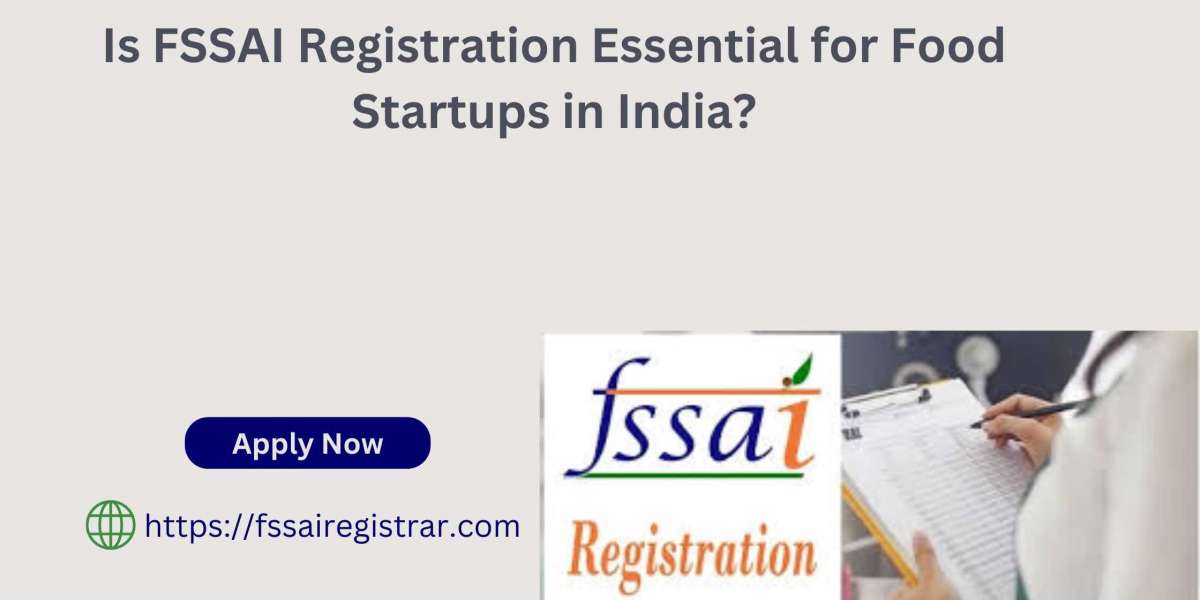Starting a new business is an exciting journey, especially when you’re venturing into the food industry. Whether you're planning to open a restaurant, launch a food delivery service, or sell homemade snacks, one thing is certain: ensuring food safety is key. This is where the Food Safety and Standards Authority of India (FSSAI) comes in. FSSAI is the regulatory body that governs food safety standards in India. It ensures that the food we consume is safe, nutritious, and of good quality. If you're a startup in the food sector, you might be wondering, "Do I need FSSAI registration for my food business?" The simple answer is: yes, it’s highly recommended. It’s often mandatory, depending on the scale and type of your food business.
What is FSSAI Registration?
FSSAI stands for Food Safety and Standards Authority of India. It is an autonomous body under the Ministry of Health Family Welfare, Government of India, responsible for regulating and supervising food safety in India. FSSAI Registration is the process of obtaining official recognition for your food business. This registration ensures that your business complies with all food safety regulations.
The FSSAI issues three types of registration and licenses:
- Basic FSSAI Registration: For businesses with an annual turnover of up to ₹12 lakhs.
- State FSSAI License: For businesses with an annual turnover between ₹12 lakhs and ₹20 crores.
- Central FSSAI License: For businesses with an annual turnover above ₹20 crores or for those involved in importing or exporting food products.
Why FSSAI Registration is Important for Startups
Here are some compelling reasons why your startup should get FSSAI registration:
Legal Requirement
FSSAI registration is not just a formality — it’s a legal requirement for all food businesses in India. Whether you are selling food directly to consumers or supplying it to restaurants, shops, or online platforms, the law mandates FSSAI registration for any business involved in food production, storage, distribution, or sale.
Without an FSSAI registration, you may face legal issues or fines from regulatory authorities. In some cases, authorities may shut down your business if it operates without the necessary food safety compliance.
Builds Trust and Credibility
One of the primary benefits of FSSAI registration is that it builds trust with your customers. When your food business is registered with FSSAI, you are assuring your customers that you adhere to strict food safety standards and that the products you offer are safe to consume.
For startups, building customer trust from the outset is essential. An FSSAI registration gives your brand a professional image, helping you stand out in a competitive market. It’s an official mark that guarantees quality, which can help you attract more customers and secure long-term business relationships.
Access to Government Schemes and Subsidies
As an FSSAI-registered business, you gain access to various government schemes and subsidies meant to promote food safety and support small businesses. The government offers financial assistance to FSSAI-registered startups, including loans at lower interest rates and schemes to help you grow your food business.
FSSAI registration is often a prerequisite for availing of these schemes. This can help you reduce startup costs and ease the financial burden in the early stages of your business.
Ensures Food Safety and Compliance
FSSAI registration is closely tied to food safety standards. To get registered, businesses must adhere to guidelines that ensure food is free from contamination, accurately labeled, and properly packaged. This compliance not only protects consumers but also ensures the long-term sustainability of your business.
When your startup follows these food safety practices, you’re less likely to face complaints related to hygiene or foodborne diseases. This ensures your customers' health and your business’s reputation.
Prevents Legal Trouble
Without FSSAI registration, your startup could face legal action if something goes wrong with the food products you sell. For example, if a customer falls ill due to contaminated food, they can file a legal complaint against your business. FSSAI registration offers protection, as it provides clear guidelines for food safety. Additionally, if a legal issue arises, FSSAI registration can help reduce penalties and prove that your business is adhering to government standards.
Improves Marketing and Branding
In today’s competitive food market, effective marketing and branding are key to standing out. An FSSAI registration certificate can be prominently displayed on your website, product packaging, and marketing materials. It is a powerful marketing tool that signals to customers that your food business is reliable and trustworthy.
FSSAI certification, especially when used in your branding, tells customers that you take food safety seriously, which can influence their purchasing decisions. It also helps you appeal to quality-conscious consumers who prefer certified and safe food products.
Do All Startups Need FSSAI Registration?
The short answer is: yes, if you’re operating a food business in India, you need to get FSSAI registration or a license. However, the type of registration you need depends on the nature and size of your business.
- Small-Scale Food Businesses: If your startup has a turnover of less than ₹12 lakhs annually, you can apply for Basic FSSAI Registration. This is a simple process and involves minimal documentation.
- Medium and Large-Scale Businesses: If your business has a higher turnover or operates in multiple locations, you may need a State FSSAI License or a Central FSSAI License.
For example, if you run a small bakery or sell homemade jams, you might only need the basic registration. However, if you run a larger food manufacturing unit or import/export food items, you will need a state or central license.
What Happens If You Don’t Get FSSAI Registration?
Operating without FSSAI registration can lead to several consequences:
- Legal Penalties: The authorities can impose heavy fines or shut down your business.
- Loss of Business Reputation: Customers are more likely to avoid businesses that don’t adhere to safety standards.
- Inability to Get Loans or Government Support: Without FSSAI registration, you may be ineligible for government subsidies or financial schemes designed for food businesses.
How to Apply for FSSAI Registration?
- Submit the Application: Complete the application form with accurate details and submit it along with the necessary documents through the FSSAI portal. Make sure to pay the applicable online fees for your registration.
- Verification: A designated representative will review your FSSAI registration application to ensure all information is correct.
- Inspection: After submission, FSSAI officials may inspect your facility to verify compliance with food safety and hygiene standards.
- If your application is granted: You will be issued an FSSAI registration certificate. This certificate serves as official proof that your business complies with food safety regulations.
NOTE: If you want to Renew your FSSAI License click RENEW FOOD LICENSE CERTIFICATE
Conclusion
For any startup in the food industry, FSSAI registration is not just a legal requirement — it’s a crucial step toward building trust, ensuring food safety, and growing your business. It’s an easy, affordable process that offers numerous benefits, including access to government schemes, legal protection, and a credible brand image. Whether you’re running a small bakery, an online food delivery service, or planning to open a restaurant, FSSAI registration helps you comply with food safety laws and assures your customers that your food products are safe and high-quality. So, if you’re in the food business, don’t wait—apply for FSSAI registration today!







